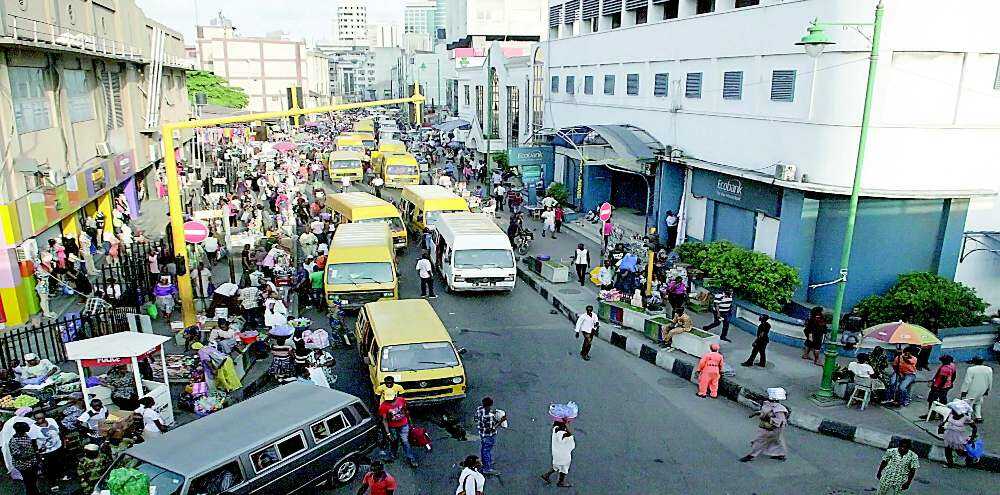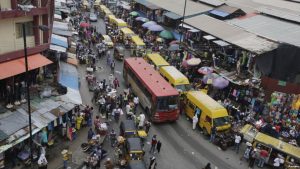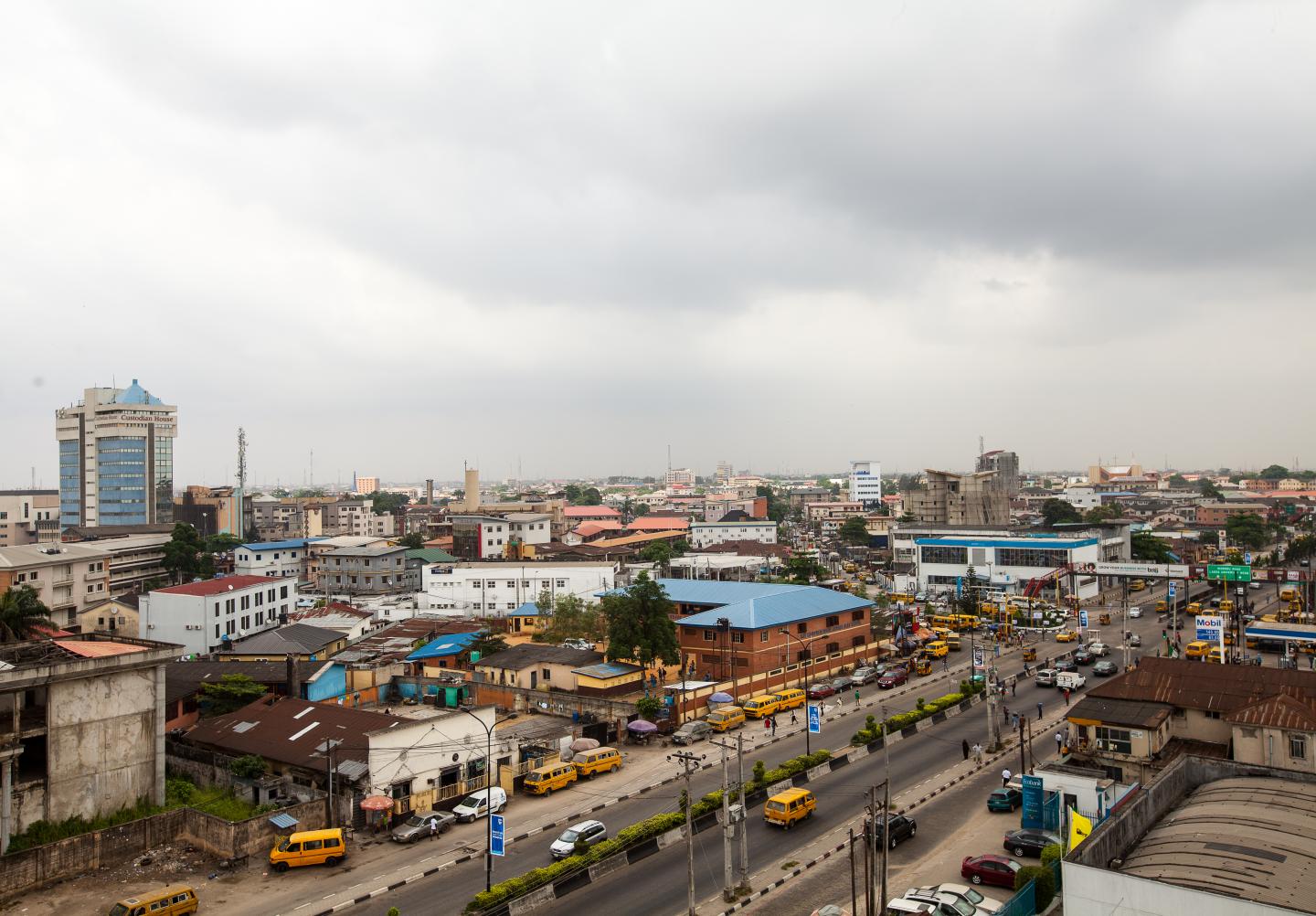The Lagos State governor, Akinwunmi Ambode, is winding down his administration of Lagos, Nigeria’s commercial capital city with six months left in the four-year cycle.
Happenings and developments around the city, especially on security, give a bold statement – Governor Ambode is racing against time in a tall order to finish strong.

It was a slow start to put his Itesiwaju Eko lo je wa logun stamp on governance, coming after the eight years of former governor Babatunde Fashola’s Eko o ni baje, which still resonates across the length and breath of the state.
A report by the London’s Economist captures the first six months of Ambode’s administration. Titled ‘Urban Traffic Paralysed’ the article tried to find answers to why movement within Lagos had become unusually dense and stymied.
The brief article went on to announce associated security challenges, such as robbers taking advantage of the entanglement to harass and rob motorists.
At the time, Lagosians were daily bombarded with tales of numerous attacks on residential areas and commercial premises across the state. Two incidents that occurred in October 2015 are worth mentioning.
The first was the brutal murder of Tajudeen Disu, the Managing Director of the Lekki Free Trade Zone.
Disu was killed on October 12 by rioters at the Free Trade Zone. The following day, October 13, a large number of well-armed robbery gang took over FESTAC town for about two hours. In the process, they robbed two banks and killed a middle-aged woman and her daughter.
That same month, hoodlums took over the Ketu-Ikorodu Road axis of the state snatching handbags, money, trinkets and any valuable in sight in broad daylight from motorists and commuters who were held in the traffic snarl.
This went on for a long time without any security agency, particularly the police, intervening. The case of traffic robbers became worrisome as it was growing to become a common feature in almost all parts of the commercial city.
After some barrage of criticisms, the governor got a handle on the spate of insecurity and relative peace returned to the state though with the pockets of crises still rearing its ugly head in some areas.
Fast-forward to November 2018 and it appears the history of 2015 is repeating itself.
Last Tuesday, The Guardian newspaper’s Editor-in-Chief, Mr. Debo Adesina, was attacked by daredevil traffic robbers in broad daylight on Oshodi Bridge.
The robbers, who took to their heels immediately after the act, dispossessed him of his phones and other valuables.
It was reported that the robbers had a swell moment going from car to car, smashing windscreens and collecting valuables from innocent motorists. Items stolen from Adesina included mobile phones, cash and company identity card.
Thankfully, in record time, the police arrested one Tunde Segun, 23; Ayo Omoniyi, 24; and Samson Oyeleye, 22, for the robbery.
The Commissioner of Police, Edgal Imohimi, while parading the suspects on Friday, said the command, while acting on a tip-off received from commuters about the attack, directed the Officer-in-Charge of the Rapid Response Squad (RRS), to deploy police riders to Oshodi Bridge, where the suspects were arrested.
Despite the swift response of the police, Lagosians have continued to call on the governor to address the increasing trend in traffic robbery and other cases of insecurity in the state.
The issue has escalated as the robbers now operate boldly, even near places where there are security agents.
They are everywhere from the Anthony stretch onto Oshodi-Isolo Expressway to Toyota Bus Stop, where Ambode’s ongoing construction work has worsened traffic situation that stretches from Anthony to Toyota bus stop.
Online information hub on Lagos traffic situation, Giditraffic, on November 18, warned motorists to avoid Eko Bridge, claiming that robbers were exploiting the near-standstill situation on the bridge to rob.
Taking to its verified Twitter handle @Gidi_Traffic, it wrote: “Eko Bridge is no go area because of tankers and trailers and people are now taking one way around Alaka, Funsho Williams Avenue. Boys are taking advantage to rob car owners.”
Apart from Oshodi, other flashpoints where the hoodlums operate are Murtala Muhammed Airport Road, Costain/National Theatre, Third Mainland Bridge, Anthony-Oshodi Road, Gbagada-Oworonshoki-Ketu Expressway, Mile Two-Badagry Expressway, Ojota-Berger- Long Bridge on Lagos-Ibadan Expressway and Agege Motor Road.
Meanwhile, stakeholders are looking forward to the Lagos State Security Trust Fund (LSSTF) to brainstorm on tackling the recurring menace. The LSSTF is set to organize its annual Town Hall Meeting on Security hosted by the governor on Wednesday, November 28, at the Civic Center, Ozumba Mbadiwe Avenue, Victoria Island, Lagos by 11:00a.m.
The event is a forum where the Fund renders an account of its stewardship to stakeholders and donors to the Fund. Also at the meeting, the Commissioner of Police, Lagos State will present a report on its activities, challenges and achievements, while Governor Ambode shares his administration’s initiatives and accomplishments as regards security.
In line with the theme of this year’s Town Hall Meeting, which is: Security in Lagos State: Progress and Challenges, there will be a presentation of the Report of the Lagos State Security Summit 2018 held in April 2018 to Ambode by members of the Organizing Committee led by the chairman, Mr. Opeyemi Agbaje.
At the 11th Town Hall Meeting on Security, which coincided with the 10th anniversary of the LSSTF, stakeholders commended the LSSTF initiative while asserting that it has helped in no small measure to address the state’s peculiar security situation through prompt provision of necessary professional and logistical supports for the various security agencies in the state to operate seamlessly.
Being the commercial nerve centre of Nigeria, and indeed West Africa, Lagos has its peculiar security challenges.
Its sheer human density driven by an increasing population due to endless survival and economic driven immigration makes it naturally attractive to criminal activities.
But the coming of the LSSTF, the first of its kind in the country, seems to have really assisted in swiftly addressing some the state’s most critical security concerns.
For a mega-city like Lagos, the Police-Personnel Population ratio of 1-400 in a state with estimated population of about 24 million is considered a big security issue.

Hence the LSSTF envisioned more highly trained men and women working with modern logistic support, with effective cooperation and collaboration with other stakeholders.
Pursuant to this, the LSSTF have been investing hugely in the empowerment of the various security agencies in the state.
It will be recalled that on 3rd September, 2007, the Lagos State government established the LSSTF as a public-private partnership framework for mobilizing and providing equipment and resources for effective operations of security agencies in the state.
The LSSTF was a practical response to the reality of the operational deficiency of the various security agencies within the state, particularly with respect to funding and provision of modern equipment.
With the realisation that the huge demands of security can no longer be met by government alone, the LSSTF is primarily conceived to institutionalise an enduring public/private approach to security challenges in the state.
The law setting up the Fund provides for the structure, funding, decision making and accountability procedures for the Trust Fund.
The main goal of the Trust Fund is to provide money for the acquisition and deployment of security equipment and such human, material and financial resources as shall be found necessary for the effective functioning of all Federal, State, Local Government and other security agencies operating in the State and part of the Fund shall be reserved for the training and retraining of security personnel.
The LSSTF comprises a Board of Trustees headed by a Chairman while the day to day administration of the Fund lies in the hand of a Chief Executive who is designated Executive Secretary and his main mandate is to execute the decisions of the Board.
The Executive Secretary and all members of the Board are all appointees of the State governor and they are to serve for fixed terms as provided by the Fund’s enabling Law.
The monies and assets of the Fund comprise voluntary donations by the Lagos State Government, Local Governments, the Organised Private Sector [OPS], the Informal Business Sector [IBS] and private citizens.
The Board of Trustees ,among others, solicits for and receives donations to the Fund, reviews the financial status of the Fund from time to time, liaise with relevant security officials such as the Commander of the Police, the Director of the State Security Service [SSS], etc, receives security reports from the Commander of Rapid Response Squad [RRS], and other vital security agencies, advises the governor on the security needs as advised by the police and receives and reviews proposals on supply and maintenance of security equipment, training, communications, etc.
With regular provision of training and critical security equipment such as surveillance helicopters, operational vehicles, motorbikes, arms and ammunitions, patrol boats, Armoured Personnel Carriers among others crucial operational needs to relevant security agencies in the state, crime rate in the state has, no doubt, been on progressive decline in the last 10 years. Consequently, most hitherto notorious areas in the state have become safer for the citizens to carry out their lawful daily activities without any fear.
It should be stressed that every investment on public security by any government is a priceless one. Universally, security is the most essential duty of any government.
This is quite understandable. Insecurity leads to chaos and anarchy which ultimately undermine every genuine effort to transform the society.
Therefore, public security remains a primary duty that any government is obliged to offer to all of its citizens on equal basis, irrespective of class, wealth, position, tribe, religion, or any other such classifications.
The main goal of public security is to ensure the protection of the citizenry against all activities that could endanger lives and properties.
The public security status of any government is ultimately an indicator of its public acceptance.
This is because public security is one of the most prominent factors that determines good governance and guarantees the extent of socio-economic growth and development.
The lack of viable public and safety mechanisms in any given society makes sustainable socio-economic development a very difficult task.
It is in the light of this that the Lagos state government Security Trust Fund enterprise remains an ingenious scheme which should be supported by every well meaning organization and individuals in the state.
An effective public security cannot be obtained without the active involvement, participation and support of every section of the society because public security is the responsibility of all individuals, groups, communities, organisations and other units that constitute the state.
Criminals are not spirits, they dwell in our midst. We must, therefore, observe and report every strange movements and activities in our neigbourhood to the appropriate authorities.
It is only when we develop a communal fortitude towards public security that the huge investment of the state government and other stakeholders in the state on public security could be effectively harnessed.
Femi Ogbonnikan takes a critical look at the exceptional performance of the Rapid Response Squad under the leadership of its Commander, ACP Olatunji Disu, in crime fighting and how it has helped in no small measure reduce violent crimes to the barest minimum.
Lagos is unusual in comparisons with other states of the federation. Apart from assuming a mega status, as the second fastest growing economy in Africa and seventh in the world, Lagos State plays host to both national and foreign nationalities that throng the ‘centre of excellence’ on a daily basis, in their thousands, for commercial and industrial activities. In summary, it is the economic hub of the country.
With an estimated population of 21 million, in the latest report, according to the state government, in the post colonial era, Lagos State was created on May 27, 1967, according to the ‘State Creation and transitional provisions decree No. 14 of 1967, which restructured Nigeria into a federation of 12 states, it has the highest Gross Domestic Products (GDP), which houses one of the largest and busiest ports in the African continent.
On account of the premium placed on the thriving commercial, industrial and banking activities, the state government, through the establishment of the Lagos State Security Trust Fund (LSSTF), is leaving no stone unturned in ensuring the security of lives of its citizens and investments.
Recently, Lagos State Governor, Mr. Akinwunmi Ambode, said the state government has spent over N15 billion in 2016 to beef up security and ensure the safety of lives and property.
The governor made the declaration at a dinner held at the Lagos House, Alausa, Ikeja, in honour of the Inspector General of Police (IGP), Mr. Ibrahim Idris, who was on a two-day working visit to the state.
He said security, being one of the tripods upon which his administration is built, has improved drastically since he assumed office.
He attributed the development to the sustainability of the Lagos State Security Trust Fund (LSSTF), a template, he said has helped to champion funding of security agencies to carry out effective policing across the state.
“Like the IGP said yesterday, the template of which we are using to run the Security Trust Fund is worthy of emulation and he has also averred that they would like to replicate it in other parts of the country and also for men of the Nigeria Police Force,” Ambode said.
Recommending the LSSTF model to other states, Ambode said the initiative has gotten serious buy-in by the public, revealing that out of the N15 billion spent on security last year, the private sector contributed over N5 billion.
The governor particularly commended the efforts of former Inspector General of Police, Mr. Musiliu Smith, who is the Chairman of the LSSTF, saying that the model he midwifed in 2007 has changed the face of security in the state.
“That same template that he (Smith) brought to Lagos that we have continued to use in the last 14 years and it’s been working and in different forums, he has shared how he started it and how we have also improved on it.
“For us to be having the private sector, just to give you a very clear example, as at last year, we have spent as a government close to the region of N10 billion, but the private sector has actually contributed more than N5 billion of their own money into the Security Trust Fund.
“There is no way the private sector would do that if they don’t believe in the cause of our Security Trust Fund. So I want to recommend it also to others, it is something that could work in other states. Like you said, funding is a major issue for security in this country and then we can have partnerships with the private and public sector to also help in securing the country,” Ambode noted.
Stressing that security remains fundamental to the development of the nation’s economy, the governor assured that the state government would continue to support the Police and other security agencies.
“We believe strongly that if Lagos is peaceful, there would be life in other parts of the country. I believe the task ahead is greater than the things that you have achieved in just a few months that you have been there and I believe you would make your own mark just like your predecessors,” Ambode said.
Besides, Ambode, when he received the immediate past and the new Lagos State Commissioner of Police, Mr. Fatai Owoseni and Mr. Imohinmi Edgal, respectively in his Alausa Office on Tuesday, September 5, 2017, admonished the new CP to sustain the tempo of the fight against crimes and criminalities in the state.
“What is most important to us I’d emphasised that we must keep the city safe. Lagos must be safer; and Lagos must be cleaner and it is based on that we can invite investors to come in. That is when we can protect our 24/7 economy. And so, we can’t afford not to have a vibrant police force. More importantly is the fact that we, in government, can’t have a prosperous state and the prosperity and peace that Lagos is enjoying now actually founded on that fabric of the security of lives and property,” Ambode said.
In a bid to reinvigorate the Lagos State Police Command, the Rapid Response Squad (RRS), came on stream in 1999 during the administration of Asiwaju Bola Ahmed Tinubu, the then governor, as a child of necessity, with a clear mandate to fight crime and make the state habitable for the citizenry and uninhabitable for criminal elements.

Photo: ADEOLA OLAGUNJU
With the rebranding on November 27, 2015 and provision of the modern crime fighting equipment, such as 100 (4-door) saloon cars, 55 Ford Ranger pick-up cars, 10 Toyota Landcruiser pick-up vans, three helicopters, two gun boats, 15 Armoured Personnel Carriers, others, all valued at N4.765 billion and complemented with drones and tracking devices, the Squad under the leadership of Mr. Olatunji Disu, an Assistant Commissioner of Police (ACP), has, since his inception as Commander, in no doubt, with the active support of the personnel, displayed exceptional leadership capability with the requisite capacity to respond swiftly to crime in any part of the state.
While making a giant stride in policing Lagos with vigour, born in Lagos Island to the renowned family of Disu in Rica, Tokunbo Quarters, Olatunji Disu had his post-primary school education at the prestigious May Flower Junior School, Ikenne, Ogun State under the tutelage of the prominent educationist, Dr Tai Solarin and also his senior secondary education at the Saint Gregory’s College, Lagos Island before proceeding to the Lagos State University (LASU), Ojo campus (in 1985) where he obtained a Bachelor of Arts (BA) degree in English (education).
His quest for a higher qualification saw him enrolling for a Post Graduate Diploma (PGD) in International Relations and Strategic Studies at the same LASU and subsequently a Diploma in Personnel Protection in the United Kingdom (UK).
Disu’s career in the Nigeria Police Force (NPF) began when he enlisted into the force on May 18, 1992 and he was admitted at the Nigeria Police Academy, Kaduna Anexxe.
Disu’s career progression in the force got a boost with his deployment to Lagos to serve as ADC to the then Lagos State governor, Asiwaju Bola Ahmed Tinubu, shortly after which he was posted to Ogun State Police Command as the Divisional Police Officer (DPO) in-charge of Ago-Iwoye.
On account of his sterling qualities to lead the ever Nigeria Police continent on African Union Mission in Sudan (AMIS) to quell the crisis in the war-torn Darfur in 2005 and returning home with laurels and outstanding commendations earned him various enviable positions which he has held, including his leadership as Officer in-charge of the Special Anti-Robbery Squad (SARS), Ondo State Police Command Headquarters and subsequently, Officer in-charge of the SARS, Oyo and Rivers States Police Command Headquarters respectively, helping to manage on one of the most volatile and politically turbulent states in the country.
Soon afterwards, he was elevated to a new rank as an Assistant Commissioner of Police (ACP) and he was at the Criminal Investigation Department (CID) of the Rivers State Police Command before his transfer to Lagos State Command and subsequent deployment as the Commander in-charge of RRS.
Upon his assumption of office two years, Disu and the RRS personnel have demonstrated competence which has translated in bursting several violent and fraud cases.
For instance, the arrest of the kingpin behind the seven-day kidnap of Veronica Iyabo Anisulowo, Seun Oloketuyi, at Ecovec Royal Hotel, Ojo, Lagos, sometime in April 2016, was a landmark achievement for the squad and is still fresh in memory. Oloketuyi was personally nabbed by Disu at the hotel with the aid of tracking devices while on his trail from Lanlate, Igbo-Ora, Ilero, Shaki, Ogbomosho, all in Oyo State and to Ilorin, Kwara State before he eventually took off and headed to the hotel with a bid to jetting out of the country to Dubai (United Arab Emirate), the following day in his bid to escape from arrest.
At a Lagos hospital where he had earlier visited for treatment over an undisclosed ailment, upon his arrival and met an auxiliary female nurse who attended to her, it was gathered, gave her in to the decoy team deployed led by Disu.
The lady in question and the kingpin, it was learnt, have been dating and she had cooperated with the decoy team.
“The lady took an Okada to the hotel and they had been conversing on phones, while the Commander and his boys had laid siege on the hotel.
As the lady called her and Oloketuyi was disembarking from the staircase, the Commander who pretended to be one of the customers quickly surge towards him and gripped him from behind by his jeans trouser. And that was how the kingpin was nabbed,” hinted a police sergeant that was part of the arrest.
Similarly, was the case in which one Blessing Yanyanbin kidnapped a Chinese national in Ikorodu. Another Godwin was arrested in Warri, Delta State in connection with a kidnapping incidence in Iju-Fagba, Lagos.
Also, on December 16, 2016, a five-man kidnap syndicate invaded an undisclosed hospital in Lagos Island and kidnapped its medical director and its owner.
It took the swift intervention of two armed RRS decoy teams deployed with the aid of tracking devices to locate the victim to a thick bush in Epe, an outskirt of Lagos where the police teams engaged the kidnappers in a heavy shootout.
At the end of the ensuing melee, the five kidnappers were mowed down during crossfire, while the victim was rescued unhurt after seven days incommunicado.
Others are the unravelling of the murder of a 50-year-old Bureau De Change operator, Mabel Mba Okafor, a resident of 16B, Close 9, Victoria Garden City (VGC), in Ajah, Lagos, on Wednesday, August 17, 2016.
For a week, a decoy team was deployed in Bali, Taraba State in trail of the prime suspect, Tanko Abdulateef, 22 years old, and he was apprehended.
Two mobile phones of his late boss and several other personal effects were recovered from him. The suspect confessed killing his boss by ripping open his bowel with secateurs.
Other notable achievements include the arrest of several dealers in stolen mobile phones across the state, especially in Ajegunle-Apapa and Ikeja Computer Village, leading to the recovery of cache of stolen phones; the arrest of several armed robbery suspects, one-chance gangs, blackmailers and pick pockets.
In terms of bank frauds, several cases bordering on frauds have been cracked by the RRS teams, thus leading to the arrest of several suspects and colluding bank staffers.
Some of the prominent cases are: N150 million bank fraud with the arrest of one Israel Ochenhi; Peter Ezerupe; Obeny Udeme; and a Winners Golden Bet fraud amounting to N5 million.
Of note, was the recent involvement of the RRS personnel in the raid and subsequent arrest of no fewer than 250 suspected badoo members in Ikorodu who held the entire community by the jugular for over a year.
However, RRS has taken policing beyond the traditional conventional means of crime detection and prevention. It is designed to be the first responder to crisis.
It is living up to expectations by averagely getting to crime scenes even before the nearest police formations.
The state command is leveraging on new technologies, like drone surveillance phones and social media tracking and Internet fraud at the disposal of the squad to burst many high profile cases

